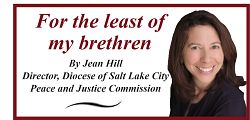Vibrant Parishes Pray and Act
Participating in Mass on Sunday, I was struck by the prayers of the faithful. As the congregation joined in prayer for people struggling with poverty, refugees and immigrants, and an end to violence, it was heartening to share in this moment of communion with my fellow Catholics seeking the common good.
Regrettably, the moment was also marred by the lack of opportunity to take concrete action beyond prayer as a community to address these same issues.
Catholic teaching compels us to pray AND act. As the Compendium of the Social Doctrine of the Church says, “The word of the Gospel, in fact, is not only to be heard but also to be observed and put into practice.” We evangelize as a church by living in ways that reflect our Gospel and have a direct impact on society. “This is not a marginal interest or activity, or one that is tacked on to the Church’s mission” the Compendium explains, “it is at the very heart of the Church’s ministry of service.” We are called to put our faith in action through activities that promote both charity AND justice.
There is a distinct advantage to answering this call. The most vibrant, faithful Catholic parishes across our country are those that embrace the full breadth of Catholic teaching and make space for prayer and acts of both charity and justice.
For the best example of this, we need only look to Pope Francis. One of the many reasons he resonates with people beyond the Catholic faithful is his exuberant embrace of our teaching. Daily, Pope Francis engages in acts of prayer, charity and justice. He doesn’t stop at praying for the poor, he creates safe environments for the homeless to receive basic services AND he advocates globally for policy changes that will better protect those without homes, whether due to poverty, politics or environmental disaster.
Many of our local parishes excel in both prayer and charitable service. But what about acts of justice? Take a moment to think about your parish. Are parishioners encouraged, invited and provided a welcoming space to be Catholic advocates?
Admittedly, acts of justice are more complicated than charitable works, so providing parishioners with these opportunities requires some diplomatic skills. Before inviting parishioners into advocacy, a parish must first understand what it means. Catholic advocacy is not partisan or “political” in the usual sense. Yes, we engage in the political process, but our approach to all issues is grounded in our beliefs, not partisan politics. Thus, we do not claim to be experts on a particular policy, but we do demand that our elected representatives ground policy in what is best for the common good.
In other words, we attempt to practice what we preach. If, for example, the Gospel readings for the day center on the beauty of family, and we join intercessions to help heal and nurture family, then we might join together at coffee hour to gather gifts for families in need. We could expand that charitable effort to include an act of justice by also inviting parishioners to join in an offering of letters to their elected representatives to keep immigrant families together, or support policies that encourage more low-income housing for homeless families.
Opening up a parish’s vocation to advocacy for justice is an act of faith. Our churches are naturally places where can have the type of respectful dialogue about injustice so desperately needed right now. By doing so, we can work together to meet not only the immediate needs of the most vulnerable, but perhaps do more to eradicate the very circumstances that make them vulnerable in the first place.
Jean Hill is director of the Diocese of Salt Lake City’s Peace & Justice Commission.
© Copyright 2024 The Diocese of Salt Lake City. All rights reserved.


Stay Connected With Us